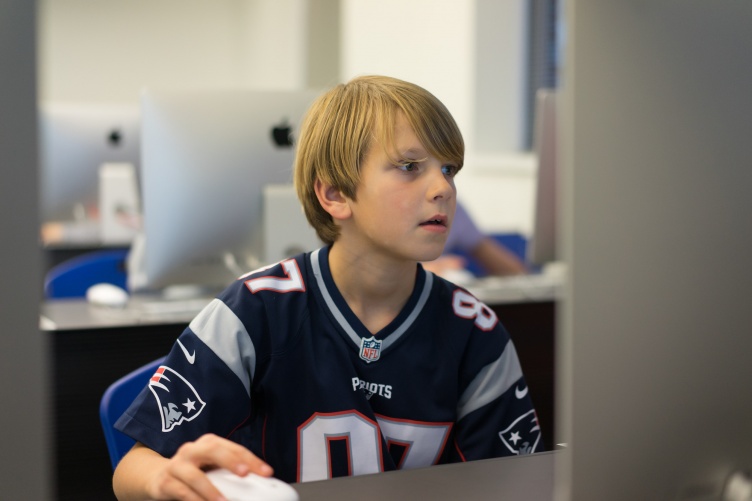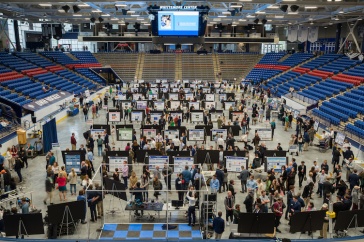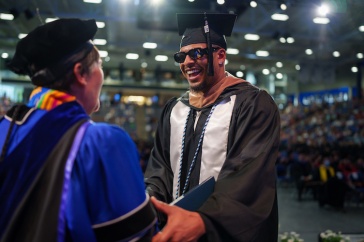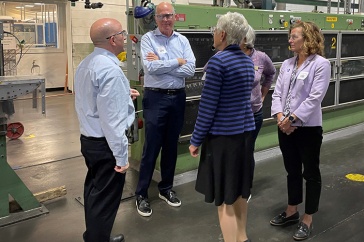
Alison Christians ’15 was halfway through teaching “The Great Gatsby” to her sophomore English class at Exeter High School when she got the email that would change the course of the school year: on Monday, we will be transitioning to online learning. It was Friday afternoon.
For teachers like Christians, across the state and country, the sharp swerve to a new normal meant pausing learning as their students knew it, and rebuilding that community one laptop at a time.
While there was certainly no ready model for what Christians needed to do, she had a framework to draw on. Christians earned her English teaching degree at UNH, where she studied alongside faculty and peers shaping a new approach to literacy – one that calls for more relevant assignments and champions writing and reading across online spaces.
“In a digital environment, you have so many more chances to get your meaning across."
Bethany Silva, UNH research assistant professor of education and director of the campus Community Literacy Center, says it’s about redefining writing as something “bigger than what you do with a pen and paper.” In her EDUC500 courses, she gets her students – all preservice teachers – actively involved in the practice of digital literacy. They do things like collaboratively annotate readings or take part in #WriteOut, an online writing event hosted by the National Writing Project and the National Parks Service.
Over the course of her five years teaching at Exeter, Christians challenged herself to “bring her students’ worlds into the classroom.” Instead of writing the standard informational essay, Christians’ students created infographics or photo essays even before the move to remote learning brought digital literacy tools to the forefront.
Alecia Magnifico, associate professor of English, structures her digital literacies course as a studio-based class that empowers preservice teachers to try out the different digital assignments themselves; this means that instead of just learning how infographics can be useful teaching tools, they actually go through the logistics of making one themselves. She says that this helps her students think more critically about the technology they use in the classroom.
“It’s not just ‘we’re going to make a video to make a video,’” Magnifico says. “It’s, ‘here’s how we’re going to make it and why it will be useful in student learning.’” She adds that digital literacy for teachers isn’t about mastering any one tool: it’s about developing the confidence to know they can figure it out.
Of course, education students at UNH also get a crash course in the more intangible qualities that can define teaching excellence – like flexibility and resilience. And while these pillars of a UNH education are critical in face-to-face classrooms, they’re all the more relevant in remote learning.
“Always put your students first, that’s what UNH emphasized for me,” says Nicole Malette ’19, a first-year high school English teacher in the Nashua School District.
Eventually, she hopes to put into practice some of the digital literacy tools she used in Magnifico’s class, like creating a Goodreads group where her students can share book reviews. But for right now, her student-focused perspective means a return to the basics. Things like making sure all of her students are able to check out Chrome books. Things like getting classroom novels in the hands of students. Things like making sure all of her 80 students are okay.
“If we can accomplish all of that,” Malette says, “that’s the new benchmark.”
Even the most digitally-focused UNH education faculty will be the first to tell you that there’s an enormous difference between teaching a two-week unit on digital learning and whole districts going online. There are, however, places to turn for light. Malette says she’s been heartened to see some of her shyest students engage more fully in virtual class discussions. She emphasizes that some of her students who never saw themselves going to college can now picture themselves succeeding with an online degree.
“This isn’t about me,” Malette says. “And that’s my fire.”
-
Written By:
Ali Goldstein | UNH Marketing



















































